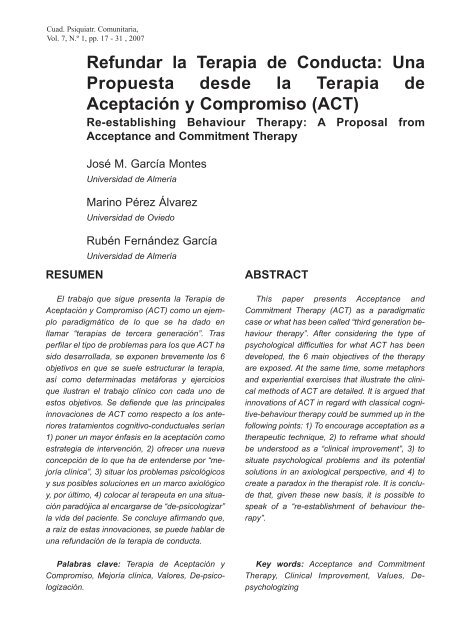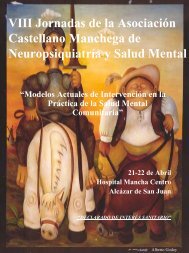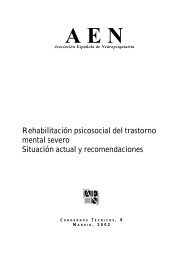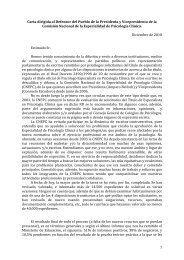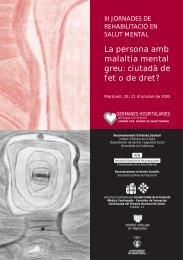Vol 7. Nº 1. 2007 - Asociación Española de Neuropsiquiatría
Vol 7. Nº 1. 2007 - Asociación Española de Neuropsiquiatría
Vol 7. Nº 1. 2007 - Asociación Española de Neuropsiquiatría
- No tags were found...
You also want an ePaper? Increase the reach of your titles
YUMPU automatically turns print PDFs into web optimized ePapers that Google loves.
Cuad. Psiquiatr. Comunitaria,<strong>Vol</strong>. 7, N.º 1, pp. 17 - 31 , <strong>2007</strong>Refundar la Terapia <strong>de</strong> Conducta: UnaPropuesta <strong>de</strong>s<strong>de</strong> la Terapia <strong>de</strong>Aceptación y Compromiso (ACT)Re-establishing Behaviour Therapy: AAcceptance and Commitment TherapyJosé M. García MontesUniversidad <strong>de</strong> AlmeríaMarino Pérez ÁlvarezUniversidad <strong>de</strong> OviedoProposal fromRESUMENRubén Fernán<strong>de</strong>z GarcíaUniversidad <strong>de</strong> AlmeríaEl trabajo que sigue presenta la Terapia <strong>de</strong>Aceptación y Compromiso (ACT) como un ejemploparadigmático <strong>de</strong> lo que se ha dado enllamar “terapias <strong>de</strong> tercera generación”. Trasperfilar el tipo <strong>de</strong> problemas para los que ACT hasido <strong>de</strong>sarrollada, se exponen brevemente los 6objetivos en que se suele estructurar la terapia,así como <strong>de</strong>terminadas metáforas y ejerciciosque ilustran el trabajo clínico con cada uno <strong>de</strong>estos objetivos. Se <strong>de</strong>fien<strong>de</strong> que las principalesinnovaciones <strong>de</strong> ACT como respecto a los anteriorestratamientos cognitivo-conductuales serían1) poner un mayor énfasis en la aceptación comoestrategia <strong>de</strong> intervención, 2) ofrecer una nuevaconcepción <strong>de</strong> lo que ha <strong>de</strong> enten<strong>de</strong>rse por “mejoríaclínica”, 3) situar los problemas psicológicosy sus posibles soluciones en un marco axiológicoy, por último, 4) colocar al terapeuta en una situaciónparadójica al encargarse <strong>de</strong> “<strong>de</strong>-psicologizar”la vida <strong>de</strong>l paciente. Se concluye afirmando que,a raíz <strong>de</strong> estas innovaciones, se pue<strong>de</strong> hablar <strong>de</strong>una refundación <strong>de</strong> la terapia <strong>de</strong> conducta.Palabras clave: Terapia <strong>de</strong> Aceptación yCompromiso, Mejoría clínica, Valores, De-psicologización.ABSTRACTThis paper presents Acceptance andCommitment Therapy (ACT) as a paradigmaticcase or what has been called “third generation behaviourtherapy”. After consi<strong>de</strong>ring the type ofpsychological difficulties for what ACT has been<strong>de</strong>veloped, the 6 main objectives of the therapyare exposed. At the same time, some metaphorsand experiential exercises that illustrate the clinicalmethods of ACT are <strong>de</strong>tailed. It is argued thatinnovations of ACT in regard with classical cognitive-behaviourtherapy could be summed up in thefollowing points: 1) To encourage acceptation as atherapeutic technique, 2) to reframe what shouldbe un<strong>de</strong>rstood as a “clinical improvement”, 3) tosituate psychological problems and its potentialsolutions in an axiological perspective, and 4) tocreate a paradox in the therapist role. It is conclu<strong>de</strong>that, given these new basis, it is possible tospeak of a “re-establishment of behaviour therapy”.Key words: Acceptance and CommitmentTherapy, Clinical Improvement, Values, Depsychologizing


